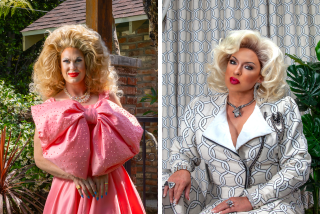3 Troupes Call Dance Critic Biased, Ask Her Replacement
- Share via
SAN DIEGO — Officers from three leading San Diego dance companies have called on San Diego Union publisher Helen Copley to replace the Union’s dance critic, charging that the critic, Anne Marie Welsh, has a conflict of interest that is damaging to them.
In an eight-page letter to Copley dated June 7, officials from the California Ballet Company, Jazz Unlimited Dance Company and Three’s Company and Dancers argued that reviews by Welsh of local dance performances during the past four years have been biased because of conflicts involving her marriage to choreographer Mieczyslaw Morawski.
The six signatories of the letter--among them California Ballet’s Maxine Mahon and Three’s Company’s Jean Isaacs--said that, from 1984 to 1988, Welsh’s reviews “started with a positive, hopeful attitude towards local dance and then began to turn sour as her husband, Mieczyslaw Morawski, approached local dance companies for work and was rebuffed, one by one.”
The letter includes several examples of what the authors claim is evidence of conflict. It was accompanied by photocopies of the reviews by Welsh and by critics from other publications writing about the same or related performances.
Welsh, reached by phone, declined to comment on the letter or the accusations, but Union editor Gerald Warren said he considers all of the allegations unfounded.
“There has been no conflict of interest,” Warren said. “(Welsh) has studiously avoided reviewing events where her husband was involved.”
Warren said he has not seen the June 7 letter, but said he has received others from some of the letter’s signatories in the past, making the same charges.
“They (the dance officials) have a minor campaign going,” Warren said. “I regard all complaints seriously; I don’t minimize them. But there has been no conflict. She is a qualified, professional dance critic and we are very proud of her.”
Warren said the Union has a full-time ombudsman to look into all complaints about the paper’s coverage and that the ombudsman, Cliff Smith, found no evidence of conflict of interest in Welsh’s reviews.
In their letter, the dance officials paint Morawski as a man who has never worked long with local companies and imply that Welsh has allowed her disappointment over her husband’s career to affect her critical judgment.
According to the letter, Welsh invited Three’s Company artistic director Jean Isaacs and her husband for dinner soon after Welsh wrote a positive review of a company concert in January, 1984. Isaacs was reportedly shown “several hours” of videos of Morawski’s ballets and told that he wanted to create a new work for Three’s Company.
When Isaacs told Morawski that his work was “inappropriate for her company’s repertory,” the letter claims, “the tone of (Welsh’s) reviews began to change.”
The letter quotes from reviews that the dance officials claim demonstrate a pattern of Welsh’s critical change of heart coinciding with their rejections of Morawski.
From an April, 1984, Welsh review of a Three’s Company performance: “It wouldn’t take much for this impressive and clearly adventurous local troupe to reach both back into tradition and forward again as it builds an even stronger repertoire . . . . “
From an October, 1984, review: “Three’s Company opened with a program that had everything except what it needed most--good choreography . . . .”
From a November, 1985 review: “Why (Three’s Company) won’t go out and beg, buy or steal some adventurous choreography or some classic modern works is the biggest mystery I have so far encountered in the performing arts here.”
Eventually, the dance company officials claim, Three’s Company allowed Morawski to choreograph a work, “Year of the Cicadas,” for its dancers in August, 1987, but were not happy with it.
According to the authors, Morawski later approached Isaacs and Three’s Company associate choreographer Nancy McCaleb while at an October, 1987, ballet and said, “I am looking forward to my dance being performed in your January concert at Mandell Weiss Theater.”
When Isaacs said she was not planning to produce the work, he reportedly repeated, “I am looking forward to my dance being performed in your January concert!”
Isaacs said she would think about it, but later sent Morawski a note saying there would be “no possibility” of using his piece.
Morawski was out of town Wednesday and could not be reached for comment.
The letter also claims that Welsh “bombed” the January concert at the Mandell Weiss Center for the Performing Arts in her review while other local reviewers praised the performance. Some of those same dances were later performed in San Francisco, and were praised by critics from both of San Francisco’ leading daily newspapers.
The letter went on to say that when Morawski taught a summer workshop for the California Ballet in 1985, students and company dancers complained that they were not happy with his classes and “his employment was not continued.” However, one of his dances was produced during the company’s regular season. Welsh did not review the company during that time.
In 1986 and 1987 Morawski was turned down three times by the California Ballet for the position of ballet master. “After Morawski’s third request for employment was rebuffed, Ms. Welsh resumed reviewing California Ballet. The reviews were extremely harsh, with a real ring of bitterness,” the letter says.
Patricia Rincon, artistic director of Jazz Unlimited Dance Company, said Wednesday that she had asked Welsh’s editor, Mary Hellman, if another reviewer could be assigned to her concerts.
“I feel she has a definite bias against jazz dance, and doesn’t believe it is an artform,” Rincon said. “When we apply for grants for funding, we are required to submit reviews. Since Anne Marie Welsh was the only consistent reviewer from the local papers, we were left with no review or only Anne Marie’s.”
Rincon said she was told by Hellman that Welsh was “doing a wonderful job.”
Rincon then discussed her concerns with other local dance artistic directors. In January, Rincon said, she and five other representatives of three companies wrote a two-page letter to Copley expressing their concerns and asking for a chance to talk about them.
Before signing the first letter, California Ballet’s Maxine Mahon submitted it to her board of trustees which voted unanimously for her to sign it, she said.
Mahon said that the January letter was “totally ignored, and none of us had a response. We didn’t send copies of the first letter to the press. I thought the first letter warranted a response. I thought it was rude when a major artform is totally ignored. That is why we’ve written the next letter.” The Union’s Warren said he believes he responded to earlier complaints but added that, if he didn’t, he would now.
Mahon, Roe and Rincon said they had received no reply from the second letter as of Wednesday. Isaacs was out of town, and efforts to contact McCaleb on Wednesday were unsuccessful.
The letter, which asked Copley to assign “a new reviewer who can watch and write about the art created here, unencumbered by strong conflicts of interest,” was signed by Mahon, Isaacs, Charles Bennett, associate director of the California Ballet, Patricia Rincon, artistic director of Jazz Unlimited, Betzi Roe, a co-artistic director of Three’s Company and Nancy McCaleb, associate choreographer of Three’s Company.
Copies of the letter were sent to area dance officials and other news people.
Warren said the complaints from the dance company officials will not affect the Union’s coverage of dance.
“Music and dance in this city deserve to be reviewed by professional standards,” Warren said. “That continues to be our policy. Somtimes, it is hard for (the dance) companies to understand.”
More to Read
The biggest entertainment stories
Get our big stories about Hollywood, film, television, music, arts, culture and more right in your inbox as soon as they publish.
You may occasionally receive promotional content from the Los Angeles Times.










